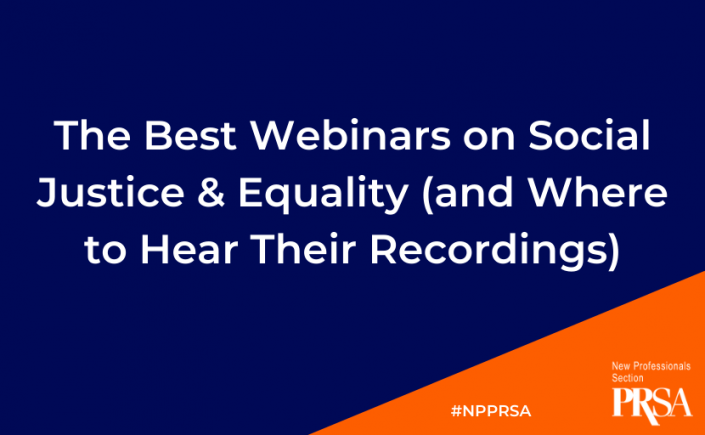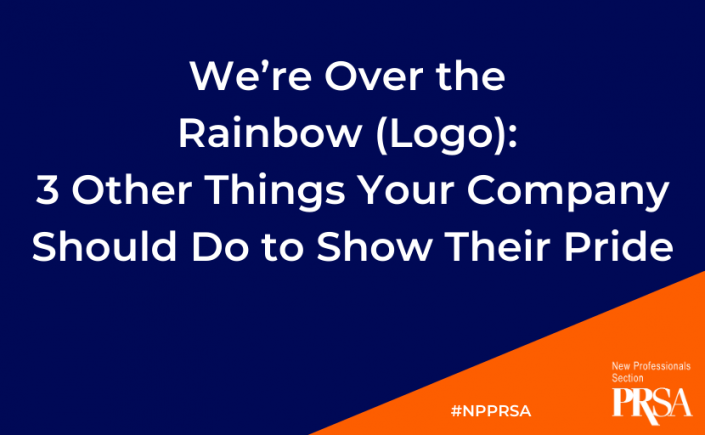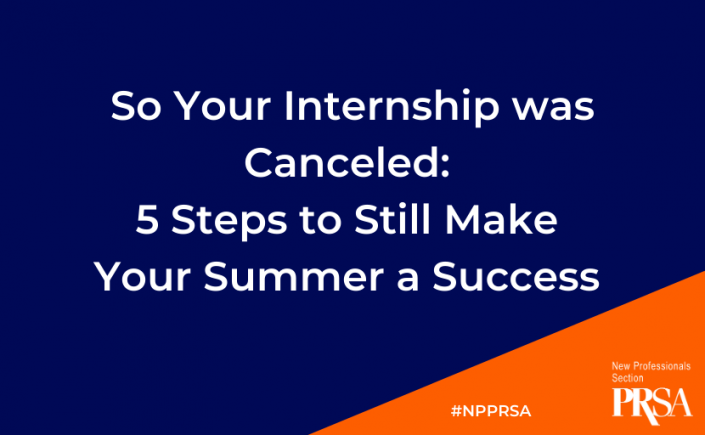PRSA’s international conference is going virtual this year, and that means it’s more affordable than ever for new public relations pros to attend. Forget the travel fees and business cards — all you need to attend ICON 2020 is a reliable computer, a clock set to EDT*, decent internet and your event registration.
From Oct. 26 through Oct. 29, attendees can expect to learn from educational offerings, virtually explore exhibit halls and network with professionals from all over the world.
Not sure where to start? Here are our top, relevant offerings for PRSA New Pros to attend.
Day One: Oct. 26
After attending the 10 a.m. ICON Orientation to make the most of your virtual experience, hop on over to the 11 a.m. Opening General Session. ICON’s keynote speaker, Jon Meacham, is described as “one of America’s most prominent public intellectuals.” Listen in to find out why.
After that, join The Future Is Now: Recruiting, Retaining and Developing Future PR leaders From Millennials and Generation Z with our very own National New Pros Committee Membership Chair Landis Tindell! He’ll share insights about New Pros with co-speaker Eric Wilson.
At 1:30 p.m., check out Exploring Advocacy, Activism and Related Trends (And What They Might Mean for Your Organization) as you consider how businesses are responding — and which ones you want to work for in the future. 2:30 p.m. begins Navigating Through Crisis With Confidence: Lessons in Crisis Management From COVID-19, which promises to share timely lessons learned.
Attend CCO Therapy: Tips, Tricks and Advice for New (and Aspiring) Communications Leaders at 3:30 p.m. for best leader practices and consider meeting a few industry veterans at the Opening Night Reception from 6 p.m. to 7 p.m.
Day Two: Oct. 27
The second day of ICON kicks off with Carolynn Johnson, chief executive officer of DiversityInc Media LLC and today’s keynote speaker taking the (virtual) stage at 11 a.m. Next, Bridging the Integration Gap: How Communications and Marketing Can Work Together to Create a Unified Brand Strategy will give real collaborative insight into how you’ll work with Marketing as a public relations pro at 12:45 p.m., though you may consider skipping out early to attend the Silver Anvil Awards at 1:45 p.m. and get a close look at what we consider exceptional work.
Humanizing Communications: How To Create Thoughtful and Inclusive Narratives at 3:30 p.m. focuses on incorporating diverse voices and recognizing unconscious biases. After that, the schedule is wide open for you to attend the Diversity & Inclusion Celebration: Transforming the Landscape event taking place at 6:30 p.m.
Day Three: Oct. 28
Keynote speaker and author of How to Lose the Information War, Nina Jankowicz, will open ICON at 11 a.m. What Every PR Pro Needs To Know About SEO prepares New Pros at 12:30 p.m. with ways to boost search engine optimization. Attorney and keynote speaker Lata Nott is known for sharing insights relating to the freedom of expression and internet speech policy, and will be speaking at 1:30 p.m.
3:10 p.m. reveals many relevant sessions for New Pros, but we think the most promising is Grace Under Pressure: Balancing Human Dignity With the Media Frenzy Around the Coronavirus. Not only will it center on COVD-19 crisis communications, but it’ll specifically tackle tough topics like neutralizing hostile audiences in the heat of the moment and dealing with “fake news” in real-time.
Sessions that look ahead often provide inspiration for our own day-to-day (especially as new professionals who may not have much experience to draw on), and The Future of PR: Today’s Trends That Shape the Profession of Tomorrow at 4:10 p.m. does just that.
Next is networking! If that’s an area you struggle with, never fear — you can easily mix and mingle at the Expo Hall Exhibitor Reception and Virtual Happy Hour. Don’t be afraid to jump into public and private chat rooms from 5 p.m. to 6:30 p.m.
Day Four: Oct. 29
Our final keynote speaker features Laurie Garrett, an award-winning science writer and author speaking at 11 a.m. The Upside of Downturn: Unlocking the Hidden Benefits of Crisis at 12:30 p.m. offers opportunities to prepare before a crisis (and explains why crisis comms is nothing to run away from).
At 1:30 p.m., Insights on Inclusion: Addressing Covering and Imposter Syndrome in the Workplace tackles very real problems for New Pros and discusses why there’s always room (and a need!) for inclusion in the workplace. A Candid Conversation on the Impact and Challenges of COVID-19 to Hospitals, VA and Health Insurance Providers will feature a panel at 2:30 p.m. with four guests talking about very real public relations challenges they continue to face in the time of COVID-19.
Whether you’re on the hunt for a job or have already secured one, Strategically Developing and Promoting You, Your Image and Your Career: A Career Action Plan Workshop at 3:30 p.m. will offer best practices for navigating your career. The final event takes place at 4:30 p.m., and Finding Resiliency for Your Membership and Yourself During a Pandemic is a great way to end ICON with the confidence and information you need in 2020.
Now that you’ve seen our recommendations, take a look at ICON’s full schedule yourself to make sure you don’t miss any sessions that may better pique your interest. Every offering available on the schedule has been hand-picked by PRSA, and will only benefit you to attend. The sessions listed here may be best for New Pros just getting started, but only you can decide which events will specifically benefit you most.
See you at the conference!
*All listed times represent Eastern Daylight Time (EDT)




